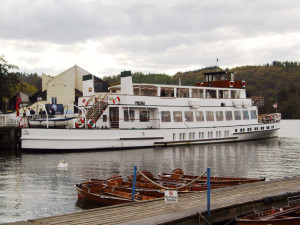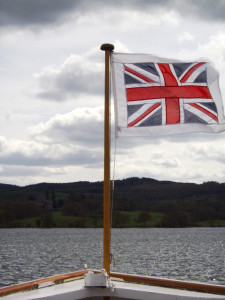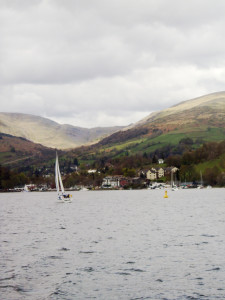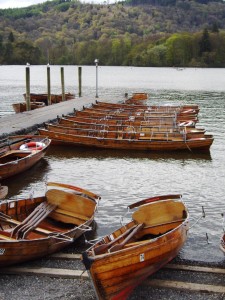by Teri Ong
In mid-June we attended the Christian Home Educators of Colorado statewide conference in Denver. We have attended all or part of every conference since 1993. We enjoy being together with a good contingent of “old timers,” some of whom even pre-date our participation. Because we see longevity of relationships as a blessing and gift of God, renewing old friendships is the best part of the conference every year.
One of our longstanding friendships is with the Bloom family, which runs a wonderful used book company called “Books Bloom.” Their business is NOT a second hand curriculum table; it is about what we in education technically call “real books” (No, I’m not being facetious!). And a lot of their books are vintage “real books.” You know which ones they are: they are the morally uplifting stories written in the first half of the last century that were greatly enjoyed by those of us who grew up in the second half of it.
In a slack time in the vendor hall, several of us were perusing the books in the “Books Bloom” booth. We began discussing the favorite stories of our youth. After awhile Mrs. Bloom observed, “Isn’t it something that in many of our favorite stories, there isn’t much parental presence?”
I thought about my own favorites. Many of them, from the classics such as The Secret Garden and The Chronicles of Narnia to the kiddie pulp fiction favorites such as The Happy Hollisters and The Boxcar Children, fit with her observation. Much of the action in all of them does indeed take place apart from the watchful eyes of grown-ups. In fact, the series I am presently enjoying for the first time (thanks to the recommendation of a friend)– the “Swallows and Amazons” series by Arthur Ransome– is of the same genre.
The four principal characters in the Ransome series are siblings John, Susan, Roger, and Titty Walker. As the series unfolds, the children have many adventures as they sail, camp, hike, and explore during their holidays. Their imaginations are allowed a good workout as they create scenarios, make up names, and draw maps to go with their explorations and “discoveries.” They visit “Rio” and climb “Kachenjunga.” They have encounters with pirates (two sisters with their own sailboat) and do business with “natives,” all without ever leaving the English Lake District. Their mother, of course, is “the best of all natives.”
Their mother allows them a great deal of freedom to come and go as they please. They camp alone on an island, sail their boat around a large lake, cook their own meals, do their own washing up, etc. The prospect of allowing children that much latitude in today’s culture would give the average “helicopter” parent cold sweats. Mrs. Bloom asked us if we thought there ever was a time that was innocent enough for children to be on their own like that.
 I thought of my own childhood. We lived in a neighborhood on a lake in Minnesota. Our house was half a block from the lake easement that was part of our property rights. Our mother routinely let us swim and fish with our friends and siblings without her presence. I spent hours riding bikes with the boys in the neighborhood who were my classmates. We often walked 3/4 of a mile to the nearest grocery store– on an active railroad track– across a trestle! By the time I was 17, I had a private pilot’s licence and had done solo flights all over the state. One summer, my brother and I tent camped our way from Denver, Colorado to a missionary camp near Dinorwic, Ontario, where we spent the summer as volunteers. I wasn’t allowed to do all of those things because I was perfectly mature in all ways before I did them; rather, each new experience helped me grow up in ways that might have taken much longer, or might not have happened at all, if I had not been allowed and even encouraged to do each new thing on my own.
I thought of my own childhood. We lived in a neighborhood on a lake in Minnesota. Our house was half a block from the lake easement that was part of our property rights. Our mother routinely let us swim and fish with our friends and siblings without her presence. I spent hours riding bikes with the boys in the neighborhood who were my classmates. We often walked 3/4 of a mile to the nearest grocery store– on an active railroad track– across a trestle! By the time I was 17, I had a private pilot’s licence and had done solo flights all over the state. One summer, my brother and I tent camped our way from Denver, Colorado to a missionary camp near Dinorwic, Ontario, where we spent the summer as volunteers. I wasn’t allowed to do all of those things because I was perfectly mature in all ways before I did them; rather, each new experience helped me grow up in ways that might have taken much longer, or might not have happened at all, if I had not been allowed and even encouraged to do each new thing on my own.
Why do we like stories of youthful adventure? I believe we like the kind of stories that resonate harmoniously with the Great Story of the universe. And the best of these stories do just that. Let me illustrate with some examples from We Didn’t Mean to Go to Sea by Arthur Ransome.
The Walkers are in Ipswich awaiting a visit from their father, on furlough from the Royal Navy. They have met a mature young man who has his own seaworthy sailboat. He is well-thought of by all who know him, and Mrs. Walker gives the children permission to spend a day and a night on his vessel. Generally, Mrs. Walker, “the best of all natives,” makes sure they have all the provisions they need and that accounts are settled with other natives who have helped along the way. She also makes sure there is a line of communications open when they have a need. All is going well until the young man goes ashore to get some gasoline for the engine. The children are safely anchored and responsibly awaiting his return, just as they were told to do. But the young man is struck by a bus and ends up in the hospital with a head injury, unbeknownst to the children (no cell phones in the 1930’s!).
The tide comes in, lifts their boat and its anchor, and in time, the children are swept out to sea. For awhile, they battle to navigate in a dense
fog, then a fierce storm comes up. This is every parent’s worst nightmare! But the children have been well trained by their sailor dad and their practical-minded mom. They make wise decisions and work out of each jam in a reasoned and sensible way.
As I thought about the parental role in these wonderful stories, it occurred to me that the parents, though not visible and personally micro-managing the details of life for their children, are truly omnipresent in spirit. The Walker children always attempt to honor their parents through their decision making and actions, when things are going well and when unexpected difficulties arise.
In We Didn’t Mean to Go to Sea, the children figure out how to manage the larger vessel because they can apply the knowledge they gained from sailing their own smaller boat, and can recall advice and examples of good seamanship that came from their father. Always in the back of John’s mind is the goal of bringing them all with their vessel safe to harbor so that his father will be proud of him. Susan, the oldest sister, works very hard to keep the craft orderly, make sure all aboard have adequate meals on a proper schedule, and get the younger ones to bed on time. She even oversees bathing and toothbrushing. Standards of decency must not be allowed to slip!
There is no alternative plan of action– they must make their way across the Channel to the first landfall. As they handle each crisis that comes up, they are always thinking of what their mother or father would do or would want them to do. Eventually they make their way to Holland and unexpectedly meet up with their father, who is crossing the other direction on his way home. The children know that he wishes circumstances had not been as perilous for them as they were, but they are glad he is pleased with the way they handled themselves. John is especially pleased when his father gives his shoulder a squeeze and says, “You’ll be a seaman yet, my son.” (p. 286)
Our Father God is not always visible in our stories either, yet He is likewise omnipresent.
He has taken care of our provisions and makes sure accounts are settled. He has taught us skills along the way and has given us the best of all examples– Jesus Christ. We have everything we need to navigate through increasingly difficult circumstances. He guides us by His Spirit as we seek to honor Him in our decision making and in our actions. And we, like the youthful John Walker, will be ever so pleased when Father says to us, “You’ll be a Christian yet, my child.”
References:
Ransome, Arthur. We Didn’t Mean to Go to Sea. London: Jonathan Cape, 1988 printing.
Bloom, Jan. Who Should We Then Read? Cokato, Minnesota: Booksbloom, 2001. This is an excellent resource with lists of books, recommendations and warnings, and much biographical information about many popular authors.
Pictures of Lake Windermere, England, taken by Teri Ong in May, 2015.

